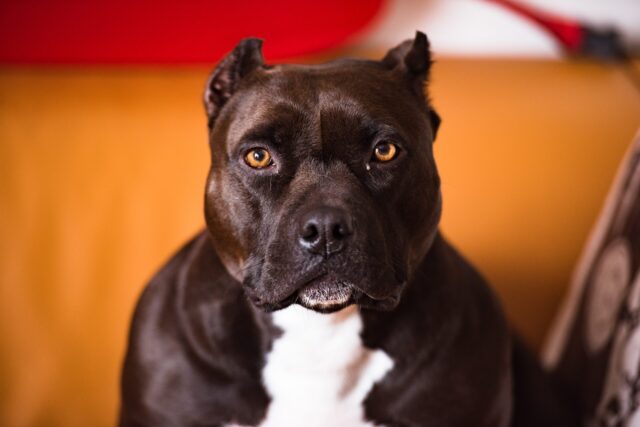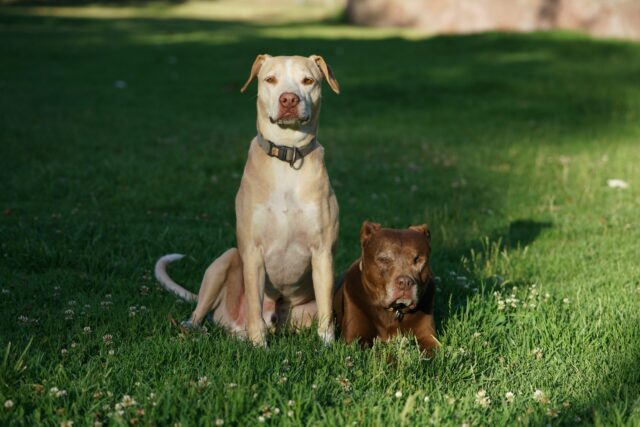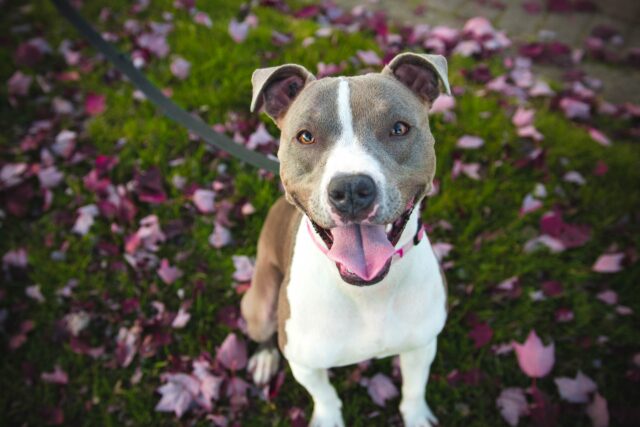iHeartDogs is reader-supported. When you buy via links on our site, we may earn an affiliate commission at no extra cost to you.

If your best buddy is a Pit Bull, then you know these loyal and loving bully dogs are also strong and tough. Pitties are sturdy for sure, but even the hardiest of pups face common health problems that can break the bank. Pit Bulls tend to struggle with hip dysplasia, hypothyroidism, knee problems, allergies to everything, and skin issues, and any of these issues can run up some hefty vet bills in a hurry. Pet insurance can keep your Pit Bull in top shape, and your savings account healthy though.
But researching the best pet insurance for Pit Bulls can be such a confusing chore, right? Not anymore! In the past, finding the right insurance plan for your dog was a convoluted mess of hunting down reputable companies and confusing conversations. Now, getting free pet insurance quotes is as simple as answering a few questions and then scrolling through the best choices for your furry family. And with the iHeartDogs comparison tool, there’s no obligation to buy. You’re simply doing your homework.
Compare The Top 9 Pet Insurance Plans for Your Pit Bull Using our Free No-Obligation Quote Tool below
The simplest way to compare pet insurance prices is to use our tool below. The comparison tool will show you quotes from the top 9 pet insurance carriers, including Trupanion, Pets Best, Lemonade, ManyPets, FIGO, HealthyPaws, Prudent Pet, Spot, and Embrace pet insurance. 👇
How Much Does Pet Insurance for a Pit Bull Cost?
Below are some example pet insurance plans for a 1-year-old male Pit Bull with the zip code 75001 (Texas)
- Pets Best – $47.79 per month
- Embrace – $44.14 per month
- ManyPets – $43.89 per month
- HealthyPaws – $42.20 per month
Keep in mind that your price will vary based on your Pit Bull’s age and geographic location. Let’s get more into the conditions you’ll want your insurance to cover and the average costs of managing these issues.
Common Health Problems Associated With Pit Bulls
Hip Dysplasia
Hip dysplasia occurs when the ball-and-socket joint in a dog’s hip doesn’t form correctly and eventually leads to pain and decreased mobility. This genetic condition plagues many large dog breeds, the Pit Bull included. Once hip dysplasia has been diagnosed, the condition will require lifelong care and management by a veterinarian. Special vet diets to control weight and medications to help pain and degeneration can add up over time. And then once the hip or hips reach a certain point of deterioration, hip dysplasia surgery may be required, and you’ll be looking at costs that range from an estimated $2000 up to as much as $7000.
Not only does pet insurance cover vet visits and some treatments used in caring for hip dysplasia, but a good plan will also put a dent in the costs of any surgeries your pup needs to get back on their paws.
RELATED: Hip Dysplasia In Dogs
Hypothyroidism
Another genetic condition common to Pit Bulls, hypothyroidism occurs when the thyroid gland doesn’t produce enough thyroxine, a hormone that controls canine metabolism. Signs of hypothyroidism in Pit Bulls include hair loss from the rear legs and tail, itchy skin, decreased appetite, weight gain, muscle loss, and fatigue.
While your Pit Bull’s thyroid issues can be treated with medication, a monthly script can add up. Some pet insurance plans offer coverage on prescriptions. So, paying a little a month for an insurance plan can save you big on monthly dog meds.
Get a pet insurance quote today and learn how much you’ll save on your dog’s prescriptions.
Knee Problems in Pit Bulls
A luxating patella, a medical term for a dislocated kneecap, is a genetic condition seen commonly in Pit Bulls. If your Pittie limps or has one leg they skip using while walking or running, they might have a kneecap that pops in and out of the joint. For some dogs, it’s a quirk, but for others, it can lead to severe pain and a host of other issues like arthritis or ligament tears.
Depending on the severity of your Pitbull’s patellar luxation, your pup may require surgery, and orthopedic surgery for a Pit Bull can range from $1,000 to $5,000. In a situation like this, pet insurance can ease the financial worry a major surgery can bring. Depending on the level of coverage you choose, you can expect a significantly reduced cost, with some dog parents reporting savings up to ninety percent. And that’s huge when you’re working to give your dog back their mobility. Compare pet insurance plans for Pit Bulls and find the one you need with our handy tool.
Allergies & Skin Problems in Pit Bulls
Allergies are one of the more common health problems in Pit Bulls. And when we say Pitties have a tendency towards allergies, we aren’t kidding. Suffering from environmental, contact, and food allergies, some Pit Bulls spend their life scratching due to certain grains, proteins, fleas, soaps, and more. These allergies can leave your pup with irritated, dry, red, and uncomfortable skin. And this inflammation can lead to secondary skin infections when left untreated.
Diagnosing allergies with vet-administered tests will run around $200 – $300. Then comes medication costs for allergy drugs and injections. These monthly medicines can inflame your finances in a hurry, with Canine Journal revealing allergy shots can cost “between $300 and $500 for a four to six-month supply,” depending on where you live and the size of your Pit.
And beyond allergies, Pit Bulls are prone to certain skin conditions like ichthyosis, demodectic mange, and zinc-responsive dermatosis. These sound uncomfortable just because of their names! But what are these skin problems?
- Ichthyosis – A genetic issue also called fish scale disease, this rare condition leads to thick skin that peels in greasy flakes.
- Demodectic Mange – Known also as red mange, this type of mange occurs when the Demodex mites burrowed in the hair follicles of immature dogs or ones with weakened immune systems irritate the flesh, leading to thick, scaly, and itchy skin with hair loss.
- Zinc-Responsive Dermatosis – Seen mostly in large dogs when the body doesn’t absorb zinc as it should, this insufficiency can result in dry, flaky skin and dull or thinning fur.
Like allergies, these skin woes may mean more facetime with the vet. And each visit requires payment. Help your pup and your wallet find relief with pet insurance!
RELATED: 12 Things You Didn’t Know About Pit Bulls
Get Ahead of the Health Problems that Plague Pit Bulls with Pet Insurance
With pet insurance for your Pit Bull, you won’t have to stress about paying for vet visits because your pup is covered! And when an emergency strikes, the expensive costs to deal with the unexpected won’t be such a devastating blow to your bank account. You’ll only have to focus on getting your buddy feeling their best again. Protect your Pit Bull from common health problems and compare the top 9 pet insurance quotes that best fit your needs.
Pet Insurance Carrier Comparisons
- 9 Best Pet Insurance Plans for Dogs
- Best Cheap Pet Insurance
- Trupanion Vs. Pets Best Pet Insurance
- Trupanion Vs. Lemonade Pet Insurance
- HealthyPaws Vs. Embrace Pet Insurance
- HealthyPaws Vs. Trupanion Pet Insurance
- Embrace Vs. Trupanion Pet Insurance
- Embrace Vs. Lemonade Pet Insurance
- Trupanion Vs. FIGO Pet Insurance
- Prudent Pet Vs. Trupanion Pet Insurance
- Embrace Vs. ManyPets Pet Insurance
- Embrace Vs. FIGO Pet Insurance
- Prudent Pet Vs. Embrace Pet Insurance
- HealthyPaws Vs. ManyPets Pet Insurance
- HealthyPaws Vs. FIGO Pet Insurance
- Prudent Pet Vs. HealthyPaws Pet Insurance
- HealthyPaws Vs. Lemonade Pet Insurance
- Pets Best Vs. ManyPets Pet Insurance
- Pets Best Vs. FIGO Pet Insurance
- Prudent Pet Vs. ManyPets Pet Insurance
- Prudent Pet Vs. Pets Best Pet Insurance
- Embrace Vs. Pets Best Insurance
- HealthyPaws Vs. Pets Best Pet Insurance
- ManyPets Vs. Lemonade Pet Insurance
- Lemonade Vs. FIGO Pet Insurance
- Trupanion Vs. ManyPets Pet Insurance
- ManyPets Vs. FIGO Pet Insurance
- Lemonade Vs. Pets Best Pet Insurance
- Prudent Pet Vs. Lemonade Pet Insurance
- Prudent Pet Vs. FIGO Pet Insurance
Breed Pet Insurance
- Pet insurance for Akitas
- Pet insurance for Alaskan Malamutes
- Pet insurance for American English Coonhounds
- Pet insurance for American Staffordshire Terriers
- Pet insurance for Australian Cattle Dogs
- Pet insurance for Australian Shepherds
- Pet insurance for Basset Hounds
- Pet insurance for Beagles
- Pet insurance for Bernese Mountain Dog
- Pet insurance for Bichon Frises
- Pet insurance for Bloodhounds
- Pet insurance for Border Collies
- Pet insurance for Boston Terriers
- Pet insurance for Boxers
- Pet insurance for Bulldogs
- Pet insurance for Bullmastiffs
- Pet insurance for Bull Terriers
- Pet insurance for Cane Corsos
- Pet insurance for Cavaliers
- Pet insurance for Chesapeake Bay Retrievers
- Pet insurance for Chihuahuas
- Pet insurance for Chinese Crested Dogs
- Pet insurance for Chow Chows
- Pet insurance for Cocker Spaniels
- Pet insurance for Collies
- Pet insurance for Corgis
- Pet insurance for Dachshunds
- Pet insurance for Dobermans
- Pet insurance for Dogue De Bordeaux
- Pet insurance for English Springer Spaniels
- Pet insurance for French Bulldogs
- Pet insurance for German Shepherds
- Pet insurance for German Shorthaired Pointers
- Pet insurance for Goldendoodles
- Pet insurance for Golden Retrievers
- Pet insurance for Greyhounds
- Pet insurance for Great Danes
- Pet insurance for Great Pyrenees
- Pet insurance for Havanese
- Pet insurance for Huskies
- Pet insurance for Jack Russells
- Pet insurance for Labrador Retrievers
- Pet insurance for Labradoodles
- Pet insurance for Lhasa Apsos
- Pet insurance for Maltese
- Pet insurance for Mastiffs
- Pet insurance for Miniature Pinschers
- Pet insurance for Mixed Breeds (small)
- Pet insurance for Mixed Breeds (medium)
- Pet insurance for Mutts
- Pet insurance for Newfoundlands
- Pet insurance for Old English Sheepdogs
- Pet insurance for Papillons
- Pet insurance for Pekingese
- Pet insurance for Pit Bulls
- Pet insurance for Pomeranians
- Pet insurance for Poodles
- Pet insurance for Pugs
- Pet insurance for Rhodesian Ridgebacks
- Pet insurance for Rottweilers
- Pet insurance for Saint Bernards
- Pet insurance for Samoyeds
- Pet insurance for Schnauzers
- Pet insurance for Shar-Peis
- Pet insurance for Shelties
- Pet insurance for Shiba Inus
- Pet insurance for Shih Tzu
- Pet insurance for Staffordshire Bull Terrier
- Pet insurance for Vizslas
- Pet insurance for Weimaraners
- Pet insurance for Westies
- Pet insurance for Whippets
- Pet insurance for Yorkies
Pet Insurance by City
- Pet Insurance in San Diego
- Chicago Pet Insurance
- New York City Pet Insurance
- Pet Insurance in Seattle
- Pet Insurance in Los Angeles
- Pet Insurance in Austin
- Pet Insurance in San Antonio
- Pet Insurance in Miami
- Pet Insurance in Philadelphia
- Pet Insurance in Sacramento
- Pet Insurance in Orlando
- Pet Insurance in San Francisco
- Pet Insurance in Houston
- Pet Insurance in Dallas
- Pet Insurance in Tampa
- Pet Insurance in Pittsburgh
Pet Insurance by State
- Pet Insurance in California
- Pet Insurance in Texas
- Pet Insurance in Florida
- Pet Insurance in Pennsylvania
- Pet Insurance in Washington State
- Best Pet Insurance in Michigan
- State of Delaware Pet Insurance
- Pet Insurance in NC
- Pet Insurance in NJ
- Pet Insurance in Colorado
- Pet Insurance in Ohio
- Pet Insurance in Oregon
- Pet Insurance in Indiana
- Pet Insurance in Oklahoma
- Pet Insurance in Utah
- Pet Insurance in New York
- Pet Insurance in Massachusetts
- Pet Insurance in Arizona
- Pet Insurance in Minnesota
- Pet Insurance in Connecticut
- Pet Insurance in Wisconsin
- Pet Insurance in Hawaii
- Pet Insurance in Iowa
- Pet Insurance in New Hampshire
- Pet Insurance in Alabama
- Pet Insurance in Maine
- Pet Insurance in Maryland
- Pet Insurance in Rhode Island
- Pet Insurance in Arkansas
- Pet Insurance in Illinois
- Pet Insurance in Nebraska
- Pet Insurance in Alaska
- Pet Insurance in Louisiana
- Pet Insurance in South Carolina
- Pet Insurance in Vermont
- Pet Insurance in Georgia



 Toledo, United States.
Toledo, United States.